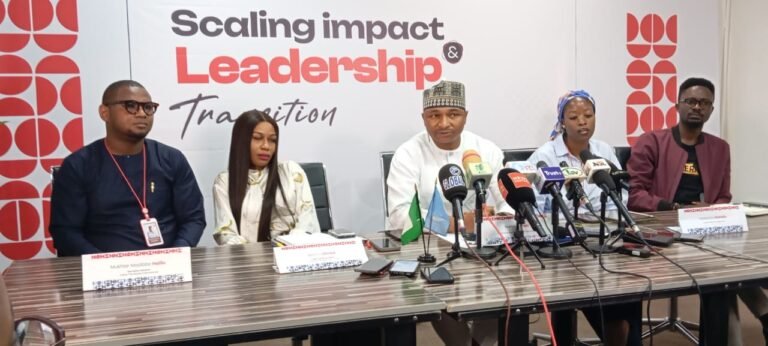The Chief Executive of Connected Development (CODE), Hamzat Lawal has explained why he was stepping down as the helmsman of the organisation after 13 years.
At a media briefing on Monday in Abuja, Lawal said that he and his team, while tracking budget funds across the country, had faced resistance, intimidation, and the difficult terrain of advocating for accountability in a system that often thrives on opacity.
He explained that his being selected as a Chevening Scholar to pursue a Master’s degree in Governance, Development, and Public Policy at the prestigious University of Sussex in the United Kingdom, accounted for his reason to step down and appoint two new officials at the organisation to take charge.
Lawal noted: “But today is not just about the past; it is about the future. I am deeply honored to share that I have been selected as a Chevening Scholar to pursue a Master’s degree in Governance, Development, and Public Policy at the prestigious University of Sussex in the United Kingdom.
“This opportunity is both humbling and inspiring, as it represents not just a personal milestone but also a chance to deepen my knowledge and bring back fresh insights that will strengthen our collective mission at Connected Development.”
Lawal noted that the organisation has worked in over 3,000 communities across Nigeria and 12 African countries, giving citizens the tools to hold leaders accountable.
He added: “We have tracked over N400 billion in budgeted funds, ensuring they translate into schools, hospitals, water, and critical infrastructure.”
He recalled that 13 years ago, he stood in a small room with nothing but an idea, a burning passion, and a determination to save lives.
Lawal said: “That idea was ‘Save Bagega’, a campaign that would draw the world’s attention to the lead poisoning crisis in Zamfara State that claimed the lives of hundreds of children.
“We mobilized global voices and compelled governments to take action. That single campaign was proof that ordinary citizens, armed with truth and conviction, could move mountains. From that beginning, Connected Development (CODE) was born.
“And today, as we mark 13 years of this journey, I stand here not to celebrate myself, but to celebrate a movement, a movement powered by citizens, driven by youth, and fueled by a vision of a more accountable, transparent, and equitable Africa.
“Over the past 13 years, CODE has grown from a grassroots initiative into Africa’s leading citizen-led accountability organization. Through our flagship initiative, Follow The Money (FTM), we have empowered marginalized communities to demand answers, track government spending, and ensure that public resources reach the people they are meant for.
“We have worked in over 3,000 communities across Nigeria and 12 African countries, giving citizens the tools to hold leaders accountable.
“We have tracked over N400 billion in budgeted funds, ensuring they translate into schools, hospitals, water, and critical infrastructure. And we have shown, time and again, that transparency is not a privilege; it is a right,” Lawal said.
Lawal also recalled CODE went on to champion Not Too Young To Run, a groundbreaking campaign that lowered the age for political participation in Nigeria and inspired youth-led movements across Africa, changing the face of democracy for a generation.
He said that during the COVID-19 pandemic, when uncertainty was at its peak, the organisation launched the COVID-19 Transparency and Accountability Project (CTAP), working over 30 organizations in Nigeria and 12 African countries to track billions of dollars in response funds.
Lawal added: “With initiatives such as Project Trust, Deepening Citizens’ Interest in Government’s Spendings and Addressing Corrupt Practices – DESPAAC, and Empowering Marginalised Oil Rich Communities – EMOC, we have deepened social accountability, advanced participatory budgeting, and strengthened local oversight, ensuring that governance is not an abstract concept but a lived reality for ordinary citizens.
“And through MoneyTrail and global collaborations on illicit financial flows, we have built cross-border capacity to track corruption risks and expose hidden financial crimes, amplifying transparency far beyond our borders.
“Each of these campaigns is more than a project; they are a movement of people demanding better, refusing to settle for broken systems, and shaping policy conversations from Nigeria to the African Union and beyond.
“Through it all, our mission has remained the same: to amplify community voices, to strengthen democracy, and to prove that when citizens act together, they can change the course of history.”

